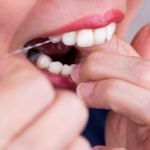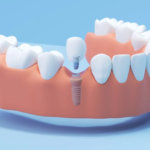What to Do in Dental Emergencies When You’re Travelling?
Imagine this: you’re on a long-awaited trip, fully prepared to relax and make the most of it. But suddenly, a sharp tooth pain or broken filling throws a wrench in your plans. Dental emergencies can be highly inconvenient, especially when you’re far from your regular dentist. Thankfully, with some practical know-how and preparation, you can manage the situation until you’re back home or find suitable care.
In this guide, we’ll walk you through what to do in common dental emergencies when travelling, how to create an emergency dental kit and tips for finding an emergency dentist on the go. Let’s ensure dental emergencies don’t derail your travel adventures!
Preparing an Emergency Dental Kit – Your Travel Essential
One of the best ways to stay ready for dental emergencies when out of town is by carrying a basic dental emergency kit. It can help you manage minor issues and relieve pain until you get professional help.
Here’s what to include in your emergency dental kit:
- Dental Floss: Essential for dislodging stuck food particles that might cause pain or discomfort.
- Temporary Filling Material: These are available over the counter and can be used to cover broken or lost fillings temporarily.
- Pain Relievers: Ibuprofen or acetaminophen can help reduce pain and inflammation.
- Salt Packets: Handy for creating saltwater rinse to reduce swelling and kill bacteria.
- Dental Wax: Useful for covering sharp edges of broken teeth or braces to prevent cuts inside the mouth.
- Sterile Gauze Pads: These can be used to control bleeding in case of oral injury.
- Cold Compress or Small Ice Pack: Helps alleviate pain and reduce swelling.
- Topical Anesthetic Gel: Provides temporary relief from tooth or gum pain.
With this kit on hand, you’ll have the basics to manage a dental emergency, giving you peace of mind while travelling.
Common Dental Emergencies and How to Handle Them?
Dental issues can crop up unexpectedly, especially in unfamiliar surroundings. Here’s how to handle some of the most common dental emergencies when travelling.
1. Toothache
Tooth pain can range from mild to severe, disrupting your travel plans. Here’s how to handle it:
- Rinse your mouth with warm saltwater to cleanse the area.
- Gently floss around the affected tooth to ensure no food particles are causing discomfort.
- Avoid chewing on that side until you get help.
- Take a pain reliever for temporary relief, but avoid placing aspirin directly on your gums as it can burn tissue.
2. Broken or Chipped Tooth
A broken or chipped tooth can be both painful and aesthetically troubling.
- Rinse your mouth with warm water to remove any debris.
- If there’s bleeding, apply gauze to the area.
- Use dental wax or temporary filling material from your kit to cover any sharp edges.
- Avoid chewing on the damaged side to prevent further damage.
3. Lost Filling or Crown
Losing a filling or crown while away can lead to tooth sensitivity and pain.
- Clean the area with warm water and avoid chewing on it.
- Apply a temporary filling material or dental wax from your kit to cover the exposed area.
- If you have the crown, clean it and try to reattach it with temporary dental cement from a local pharmacy.
4. Swollen or Bleeding Gums
Swollen gums can be caused by various issues, including injury, infection, or trapped food.
- Rinse your mouth with saltwater to soothe inflammation.
- Avoid eating hard or spicy foods that could irritate the gums further.
- Apply a cold compress on the outside of your cheek for comfort.
5. Knocked-Out Tooth
If you experience the sudden shock of a knocked-out tooth:
- Hold the tooth by the crown (top part) and rinse it with water if it’s dirty. Avoid scrubbing it.
- Try to place the tooth back into its socket gently, or keep it in a container of milk or saline.
- Seek immediate dental care as a knocked-out tooth has the best chance of being saved if treated within an hour.
Finding an Emergency Dentist When Travelling
Finding a dentist in an unfamiliar location may feel challenging, but with these steps, you can get prompt help.
- Research Beforehand: If you’re travelling for an extended period, look up emergency dental services in the area beforehand. Many cities and tourist spots have 24/7 dental services, making it easier to find help when needed.
- Use Online Resources: Websites like Google Maps, Yelp, or specific dental directories can help you locate an emergency dentist in seconds. Look for dentists with high ratings and favourable reviews.
- Contact Hotel Concierge: Hotel staff often have contacts with local medical providers, including dentists. They can help arrange a quick visit to a trusted professional.
- Local Health Care Services: Local hospitals or clinics often have emergency services or can recommend a dentist on call.
Being proactive and knowing where to turn can make a difference if a dental issue arises while travelling.
Tips for Managing Dental Emergencies Until You Reach a Dentist
In some cases, finding immediate care may take longer than expected, especially in remote areas. Here’s how to manage until you can reach a professional:
- Stick to Soft Foods: Avoid hard or crunchy foods that can worsen dental issues.
- Maintain Oral Hygiene: Keep brushing and flossing gently around the affected area. Use mouthwash if you have it to prevent bacterial growth.
- Limit Hot and Cold Drinks: Extreme temperatures can irritate sensitive teeth or gums, so try to stick with lukewarm water and mild beverages.
- Avoid Tobacco and Alcohol: Both can worsen inflammation and interfere with healing.
Staying mindful of these tips can prevent further damage and reduce discomfort until you receive professional help.
How to Prevent Dental Emergencies When Travelling?
While emergencies are unpredictable, a bit of preparation can minimise your risk of facing one while travelling.
Here’s how you can stay proactive:
- Visit Your Dentist Before Travelling: If you’re planning an extended trip, schedule a check-up beforehand to address any potential issues.
- Maintain Good Oral Hygiene: Brushing twice daily, flossing, and using mouthwash can help prevent sudden dental issues.
- Pack Your Dental Kit: As mentioned, an emergency dental kit can be a lifesaver in times of need.
- Stay Hydrated: Drinking water not only keeps you hydrated but also helps maintain saliva flow, which protects against bacteria.
Prevention is always better than cure, and these steps can help you stay prepared while travelling.
What to Remember if a Dental Emergency Occurs?
Dental emergencies can feel intimidating, but with some basic knowledge and preparation, you can effectively manage most situations. Remember to:
- Pack a dental emergency kit before setting off.
- Familiarise yourself with local resources, including emergency dental services.
- Practice good oral hygiene throughout your travels.
We hope this guide provides you with valuable insights into managing dental emergencies when travelling. And always remember, if you’re in doubt or facing severe discomfort, contact your trusted emergency dentist for detailed guidance. Your dentist’s advice, even over the phone, can help you handle the situation effectively until you find care nearby.



